Cloud storage vs. cloud computing
With convenience and cost-effectiveness, the cloud has taken the world by storm. Companies need to find the best software and services for their tech stacks, and cloud-based tools like cloud computing and cloud storage are key players for many organizations when it comes to digital transformation. While the terms cloud storage and cloud computing are often used interchangeably, they're actually two separate concepts.
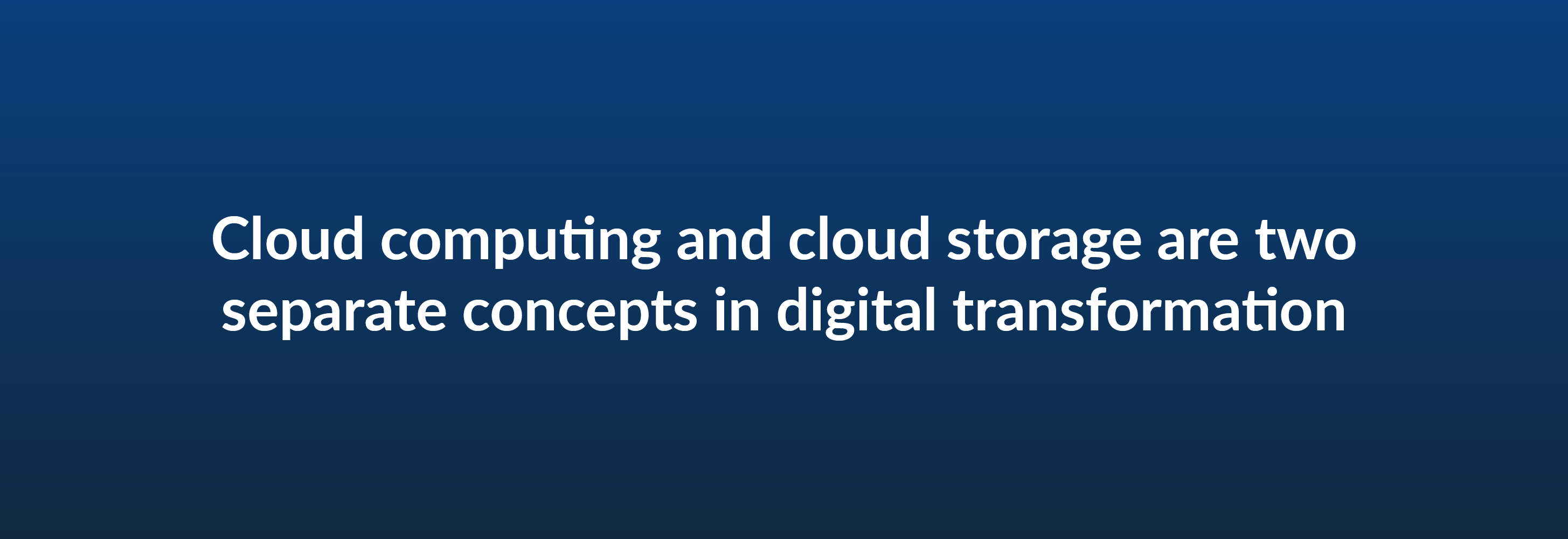
Cloud storage is necessary for cloud computing, and vice versa. You need to import your data to the cloud to use cloud computing services. Similarly, cloud computing allows you to use and transform your stored data in the cloud.
To choose the best cloud services for your organization, learn more about the key differences and similarities between the two concepts
What is cloud storage?

Cloud storage is similar to normal computer storage — it provides a space for you to store your data. However, cloud storage is entirely virtual, enabling you to upload your data to off-site, cloud-based servers via the internet, which you and other authorized users can access from any connected device. Many businesses use cloud storage services to store important documents and share them with employees and stakeholders.
Cloud storage examples and use cases
Cloud storage has applications in professional and personal spheres. Specialized cloud storage solutions are available for business use cases, which include:
Website hosting
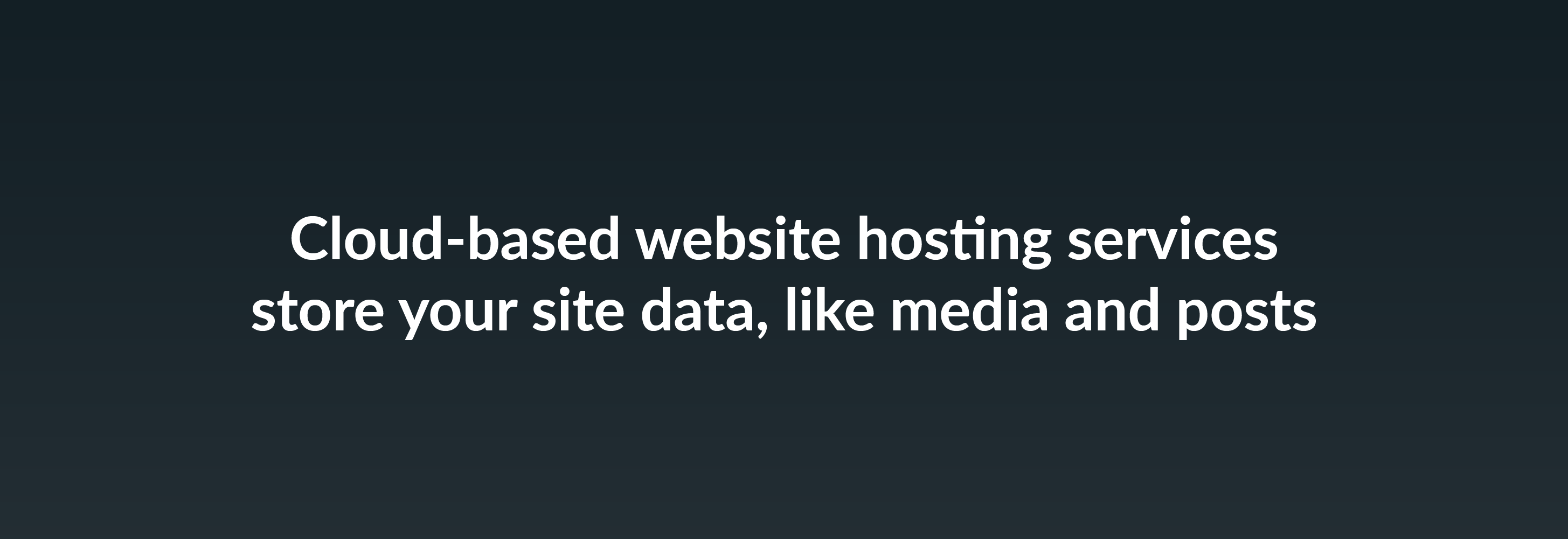
Everything on the internet uses cloud storage to host its data. Website hosting services like WP Engine and SiteGround are examples. These services store all your media, posts, and other site data in their cloud databases, so that content is readily available when you need to edit a post or when a user lands on your site. Because it's already in your web host's cloud server, you can access your content quickly with minimal latency.
File sharing
Organizations use cloud storage to save their documents and share them with collaborators like employees and business partners. With an internet connection and the right credentials, authorized users can access and download your files from anywhere in the world.
Virtual desktop hosting
Virtual desktop infrastructure (VDI) is helpful for companies with large remote workforces and bring-your-own-device (BYOD) policies because it provides additional security for business data. VDI stores all of a user's desktop information as a virtual machine (VM) in the cloud, which reduces server maintenance and overhead costs for your company. As long as the user has an internet connection, they can access their virtual desktop and complete their tasks.
Automatic data backups
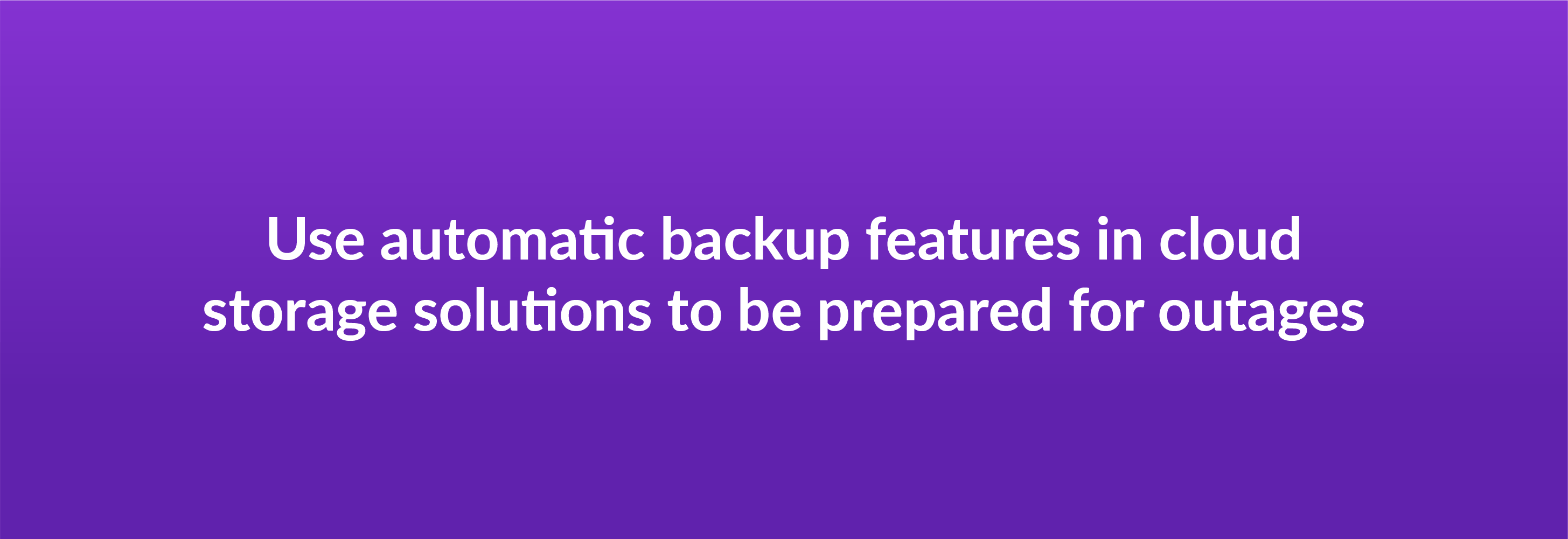
You can create an additional copy of your mission-critical business data and store it in the cloud. You'll be prepared for outages, natural disasters, and other emergencies that could halt your operations.
Many cloud storage solutions offer an automatic backup feature that runs a backup at preset intervals. This feature ensures your backup data is always up to date when you need it.
Benefits of cloud storage
Cloud storage offers many benefits for businesses of all sizes, especially those that create and manage large amounts of content or quantities of data.
Protect data from disaster
The cloud can save your company from serious damage. Blackouts and other disasters can affect data integrity and even wipe out critical data entirely, causing downtime that can lead to financial and reputational losses.
Storing your files in the cloud and backing up your critical data creates redundancy, so an extra copy of your data is available in case your original copy is wiped out. Accessing files from the cloud is typically a low-latency process, so you don't have to wait hours or days to get back to business. Simply recover your backup data, and you're set.
Secure sensitive data
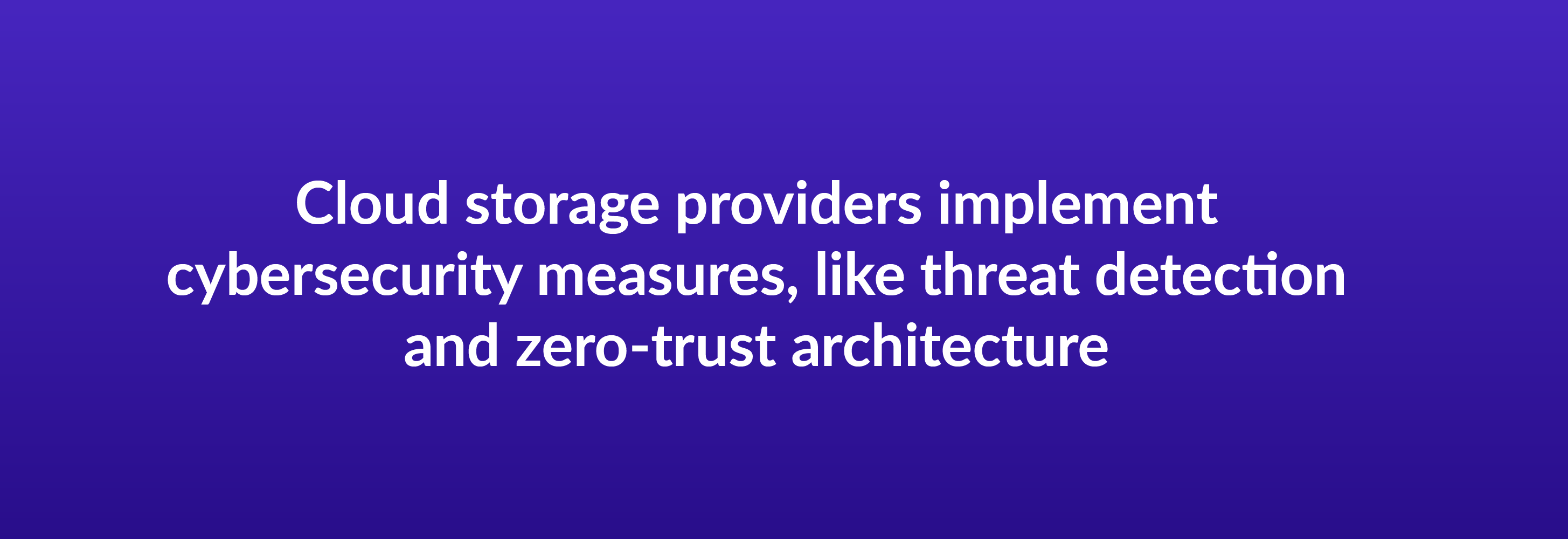
Cloud storage providers can give their customers the latest and greatest in cybersecurity measures. Global standards outline key security requirements for cloud storage providers, but a vendor that exceeds those requirements can provide even more secure storage than internal data centers.
Many cloud storage providers use advanced cybersecurity technologies like AES encryption, zero-trust architecture, and intelligent threat detection to prevent malicious actors from stealing your information. Even if a hacker manages to get past the first line of defense, these measures keep your data safe from harm. Look into each provider's security offerings to make sure your data will be protected.
Supplement storage space
The primary purpose of cloud storage is to expand your storage space beyond what your company's servers and individual devices can provide. Combining your existing space with cloud storage services also helps you free up room on your internal drives, giving you the peace of mind you need to create and edit content with confidence.
Since cloud storage is scalable, you can choose the storage plan that best fits your company's needs. Rather than buying a whole new server that ends up exceeding your business's needs, you only pay for the cloud storage you'll actually use.
Reduce operational costs
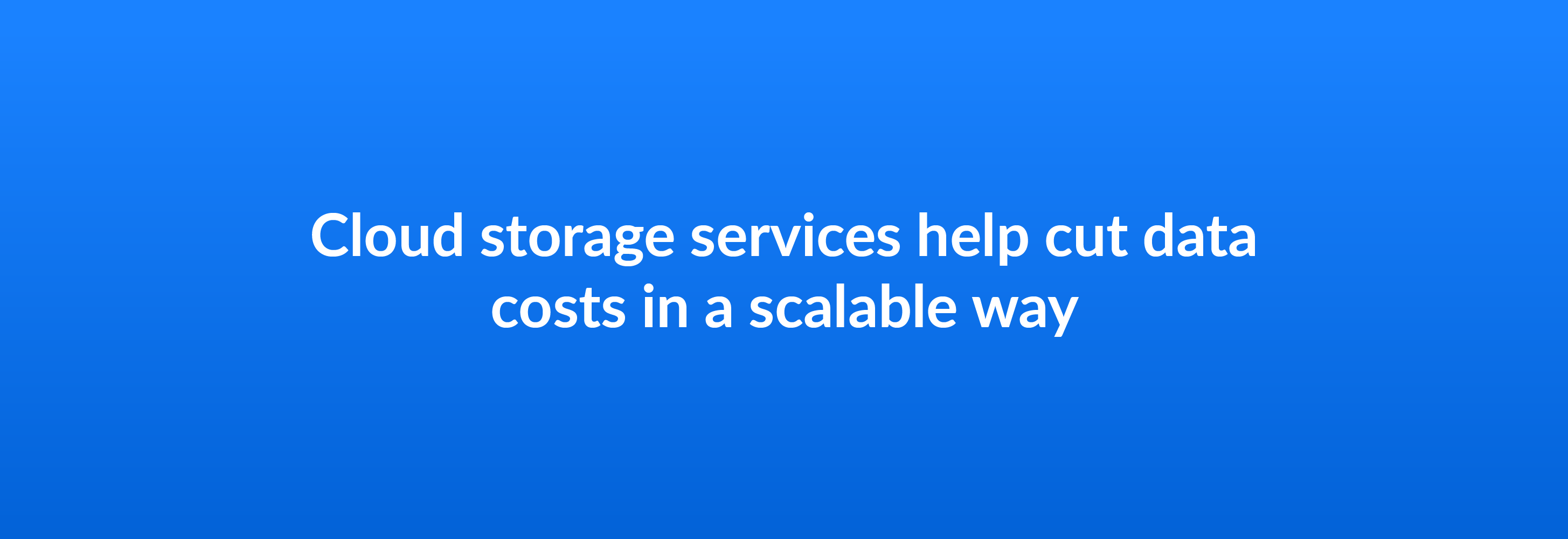
The traditional way companies store data is with on-site data centers. Legacy data centers like these work to fulfill the functions you need to perform, but they're costly to staff and maintain.
Smaller businesses rarely need to own private data centers, but the problem of keeping and maintaining in-house storage still remains. Using cloud storage can help you cut data costs with a flexible solution that you can scale to fit your business's specific needs.
So, instead of buying a whole new drive that might be too large for your needs, you only have to pay for the cloud space you use. Without the need for in-house infrastructure, you can save money on ongoing costs like upgrades, cooling, and IT staffing.
What is cloud computing?
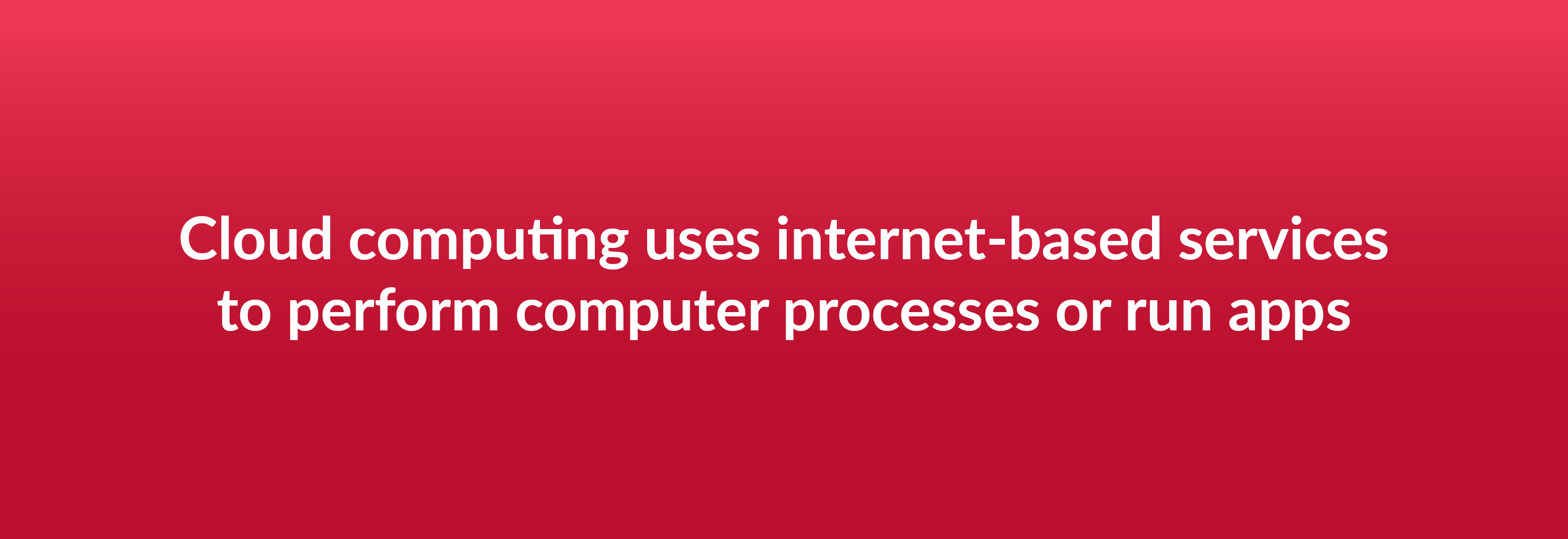
Put simply, cloud computing refers to any internet-based service that performs computational processes or runs applications.
Many businesses use third-party cloud computing services to take care of specific business functions. These services typically follow a pay-as-you-go (PAYG) pricing model, where your subscription fee covers key infrastructure like servers, applications, databases, and storage.
Cloud computing examples and use cases
Like cloud storage, cloud computing has virtually endless applications:
Cloud-based communication platforms
Modern communication largely takes place on cloud-based applications. Cloud-based email is a great example — when you send an email using a service like Gmail, iCloud Mail, or Microsoft Outlook, your message and attachments are stored in the cloud before arriving in the recipient's inbox.
Instant messaging platforms like Slack and WhatsApp also use the cloud to store conversations and attached media, letting users access previous messages and files through the application. These cloud computing functions have made personal and professional communication quicker and more efficient than ever before.
Software as a service (SaaS)
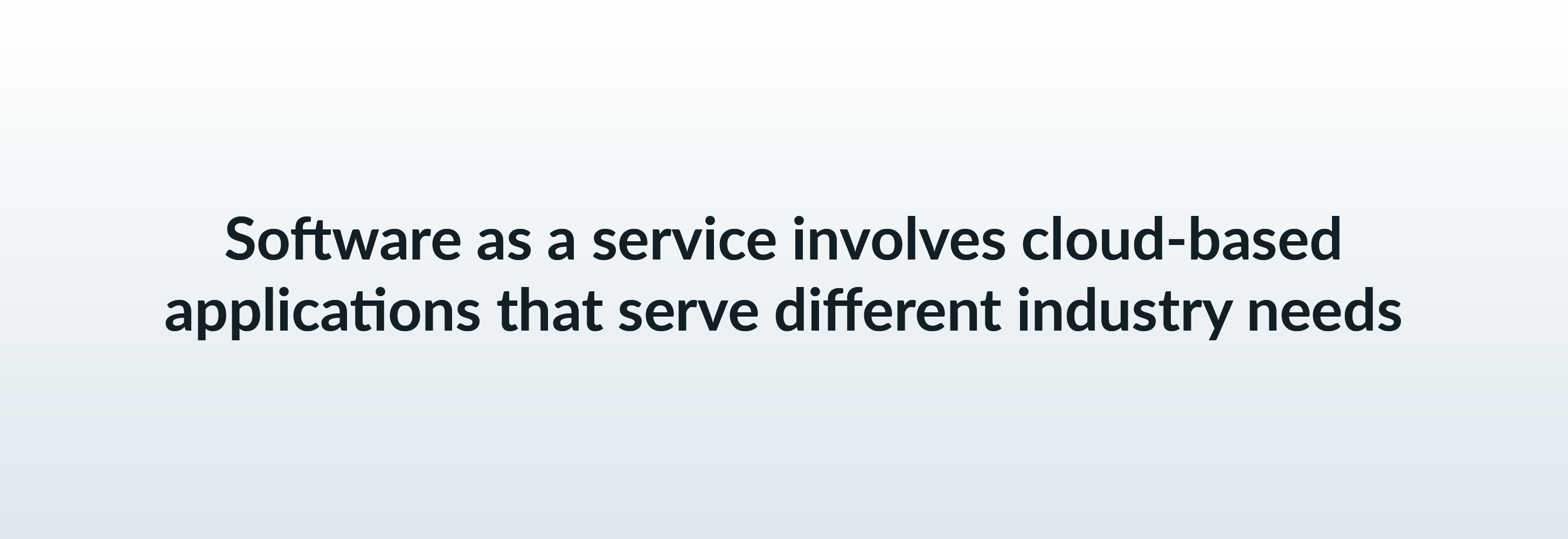
SaaS applications are fully developed cloud-based services delivered over the internet and managed by third parties. The SaaS landscape is incredibly diverse — applications range from e-commerce and telehealth to mathematical computing and video conferencing.
Most SaaS applications are browser-based, so they don't require you to download any additional software to use them — all you need is your web browser. Some platforms do offer desktop or mobile apps for convenience, but for the most part, you can accomplish all your tasks from a web portal. Many SaaS products also integrate with other popular business applications to further streamline the experience and increase productivity.
Remote data analytics
Cloud computing makes it possible for companies to perform data analytics off-site through cloud-based analytics applications.
Most cloud computing vendors provide user-friendly interfaces, allowing even inexperienced employees to easily access and use company data from any location. With these services, users can generate detailed reports and create visualizations of your data they can then share with relevant stakeholders.
Website content
When someone visits your website and engages with your content, cloud computing powers the interaction. Cloud storage hosts all the content on your website, but you need cloud computing to make that content usable.
Video streaming sites like YouTube and Vimeo are great examples. All their video content is stored in the cloud, so when a user clicks on a video, cloud computing operations run in the background to access the video's data and begin playing it.
Management systems
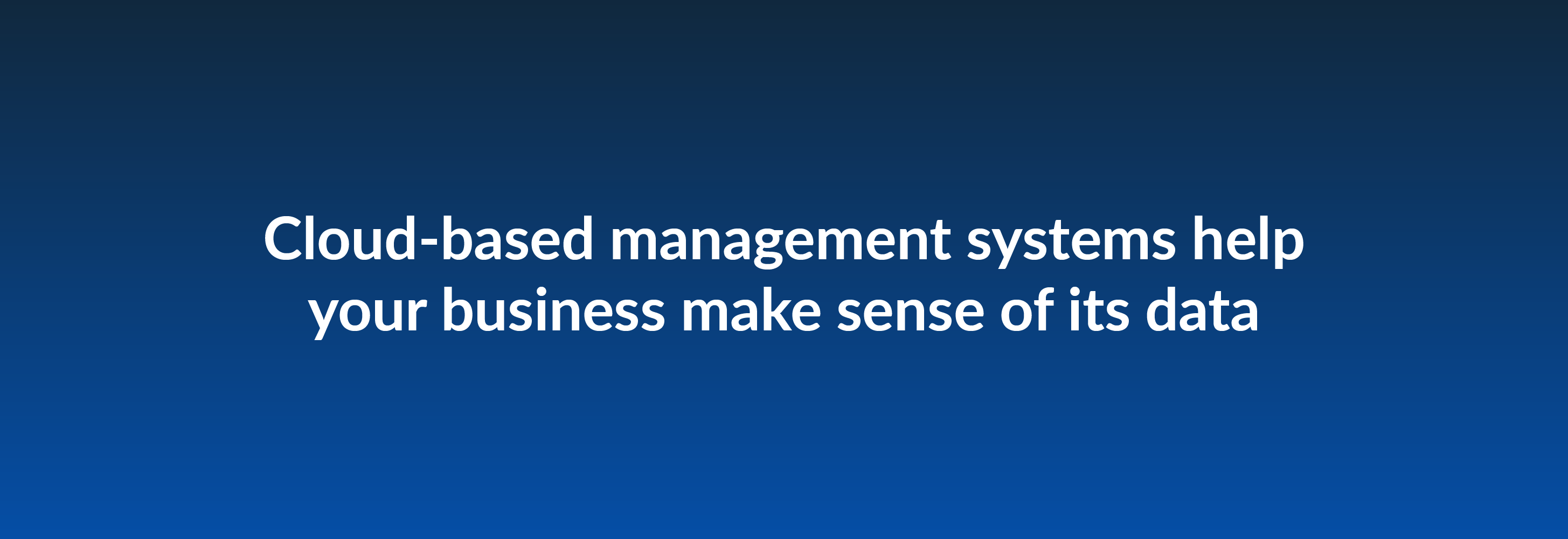
Business management systems provide larger organizations with powerful tools to make sense of their data and boost productivity. These systems house an organization's relevant data in one centralized place so employees and executives can access the information they need to make informed business decisions quickly and efficiently.
Common examples include customer management systems (CMS), enterprise resource planning (ERP) software, and supply chain management applications. Many of these solutions are web-based, but they can also be downloadable desktop applications.
Benefits of cloud computing
Cloud computing tools help organizations improve productivity and efficiency by empowering better business decisions. You can also:
Facilitate easier collaboration
Cloud computing removes barriers to communication and collaboration that are common with traditional computing methods. For example, when you edit a document in Microsoft Word, your changes are only made to the file held on your computer. That is, unless you upload it to the cloud, where any collaborators with an internet connection can view and download the new version of your document.
Cloud computing takes this a step further by enabling multiple people to work on one document simultaneously, allowing quicker, easier collaboration, even when people are working from different locations. Cloud computing also enables file versioning — a system's ability to manage multiple versions of a document while maintaining file integrity, which is essential for editing sensitive documents with multiple collaborators.
Enable remote work

Without cloud computing technology, remote work would be nearly impossible. Remote workers need to access their work files from their locations, whether they're at company headquarters or their home office.
Because cloud computing services let users access, edit, and upload files to one centralized location, employees can get tasks done from anywhere, on any internet-connected device.
Improve business agility
When the COVID-19 pandemic hit and employees were unable to come into the office, organizations had to quickly find ways to adjust to the new situation while minimizing financial loss. Critical cloud computing tools like video chat, online word processors, and instant messaging platforms let businesses pivot to remote work within only a few weeks, which allowed them to remain in operation until the lockdowns ended.
With cloud-based tools, you can quickly change course to respond to internal and external situations and maximize productivity.
Consolidate important files and applications
Getting work done quickly is difficult when your files are scattered and disorganized. Think of a file cabinet that hasn't been organized in months — you'd spend more time looking for your files than you'd spend working on them.
Cloud computing services make it easy to organize your data and applications because everything is housed under one roof. Many services include advanced features like artificial intelligence (AI) and machine learning (ML), which make it easier to find the information you need by linking related data together.
Key differences and similarities
Understanding the comparison between cloud computing versus cloud storage can help you determine which tool would work best for your business and why.
Similarities
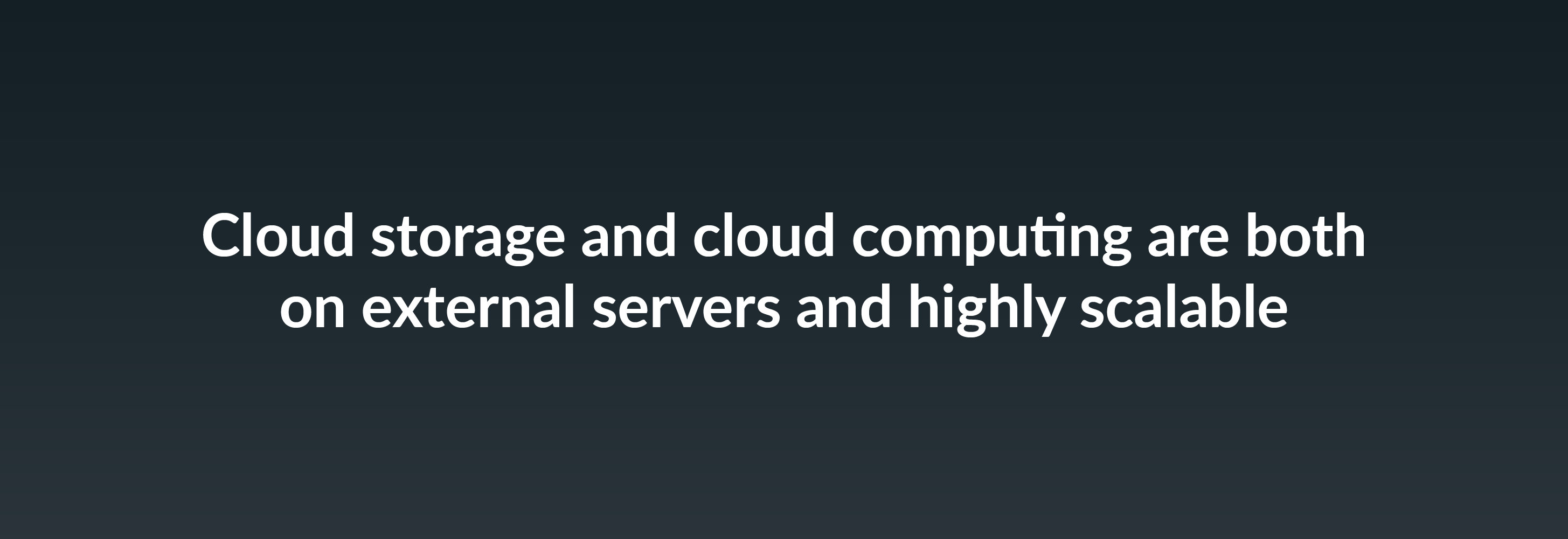
The most obvious similarity is that cloud storage and cloud computing both involve external servers, which can be anywhere in the world, depending on where your provider is based. This allows organizations to perform key business functions without needing to invest in internal server infrastructure, which makes using the cloud both cost-effective and efficient.
Both are also highly scalable, which is one of the biggest benefits of using cloud systems. Most cloud service providers use a tiered subscription-based pricing model, so you can choose the service plan that best suits your business's needs. When your business grows and you need more storage space or processing power, you simply upgrade to the next tier. Because the process takes place over the internet, you can have a new plan in just hours.
Differences
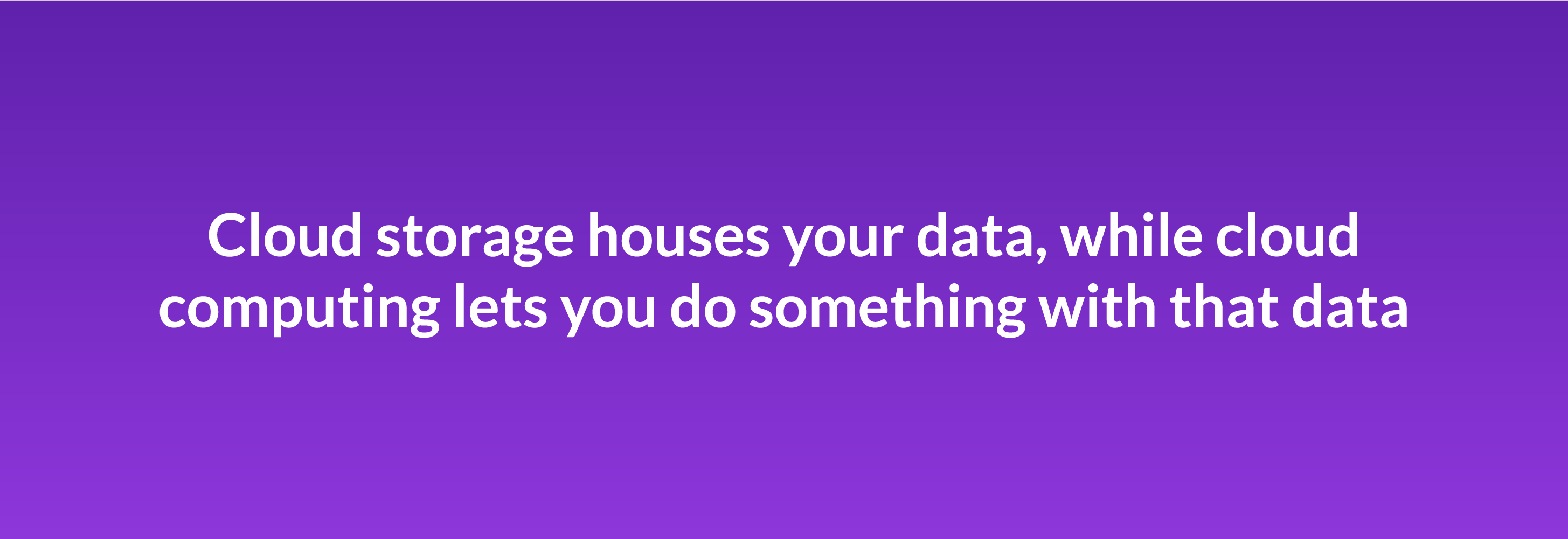
Cloud storage is for data, while cloud computing is for processes. Essentially, cloud storage simply holds your data, while cloud computing allows you to do things with that data.
The terms are also different in application. Most cloud computing programs are specifically designed for business use, while cloud storage is equally useful for both professional and personal needs. That said, some cloud computing applications are available for personal use, like Google Suite.
Another key difference is in how you determine each service's value. Cloud computing is an active service, meaning you have to consistently use the service to get value from it. Cloud storage, on the other hand, is passive. All you need to do to make the most of a cloud storage service is add your data to it.
Cloud computing and cloud storage also have different system requirements. Cloud computing requires significantly more processing power than cloud storage. Because cloud computing solutions are generally web-based, they also require less hard drive space than cloud storage, which may require you to download additional software.
Which one do you need?
Having one without the other is technically impossible. Cloud computing lets you access and use the data you have stored in the cloud, while cloud storage provides a place for you to hold that data until you need to use it.
That said, most cloud service providers specialize in one or the other — few offer both storage and computing services due to the differences in system requirements between the two.
Cloud storage
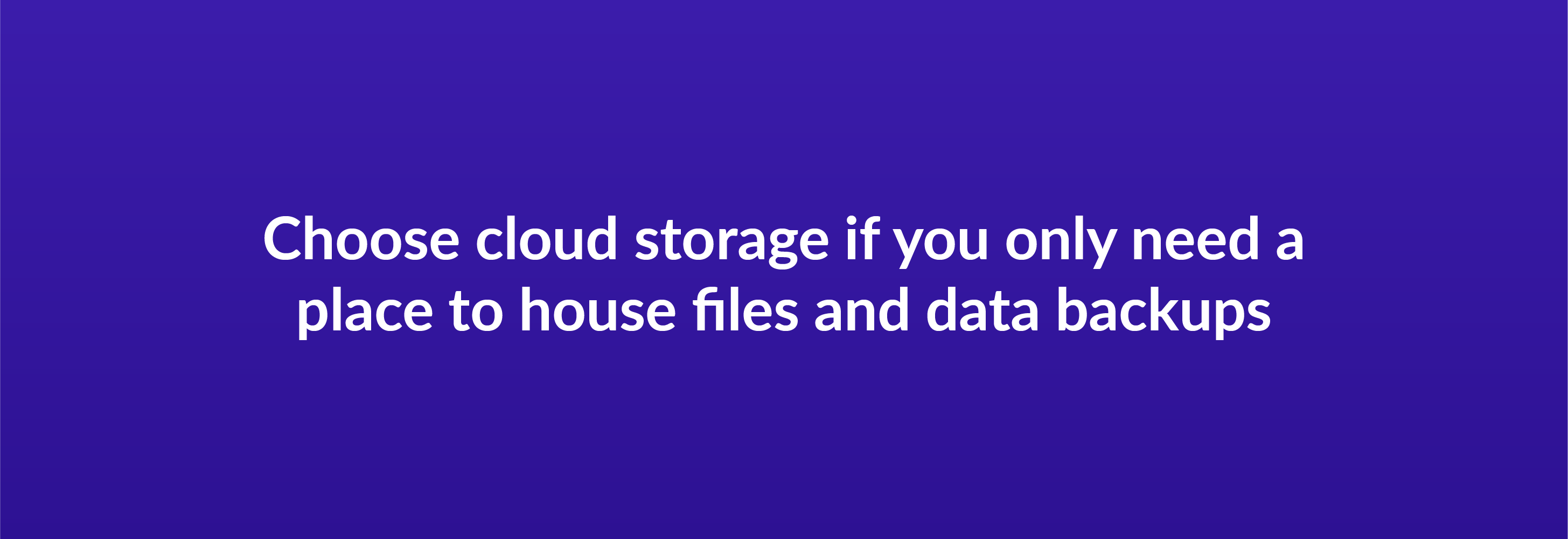
Cloud storage solutions are much simpler than cloud computing applications. They're the better option if you only need additional space to store files and backups. If you need to transform that data, cloud storage won't have the capabilities to perform these functions.
Additionally, cloud storage services are worth looking into if your company's workforce is largely remote. Having your data in the cloud makes it available and accessible to all your employees whether they're in the office or working from home.
Cloud computing
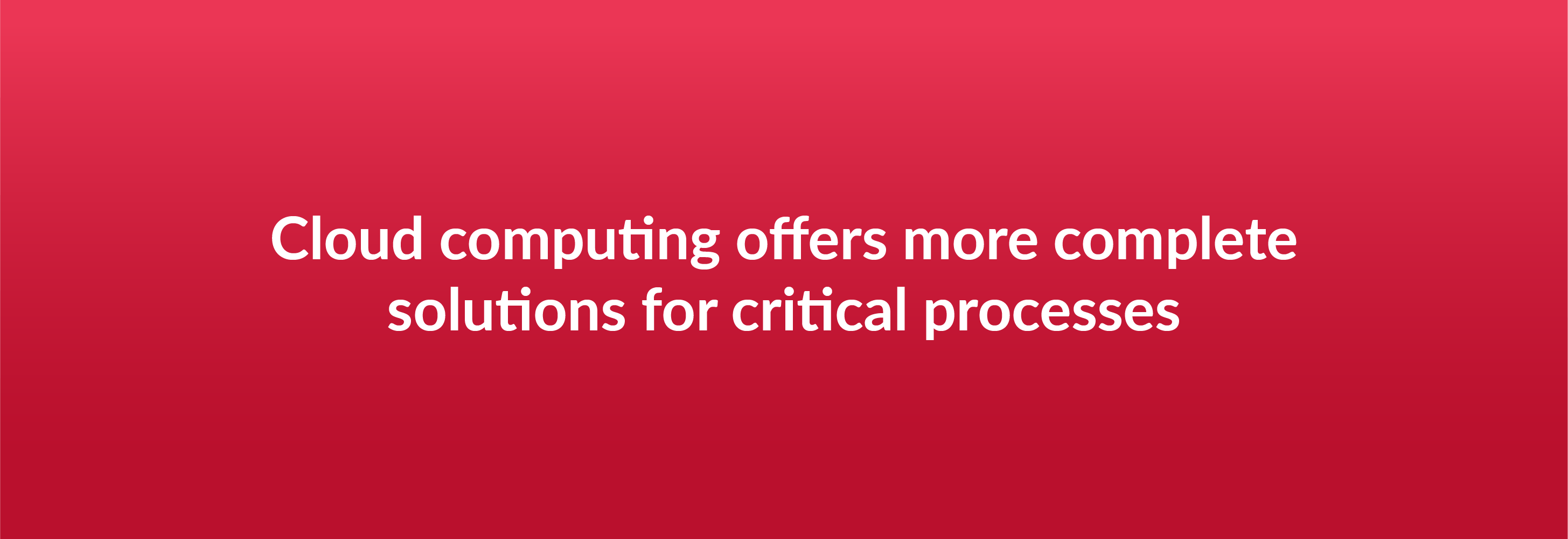
Businesses that need more complete solutions opt for cloud computing services. For example, inventory management systems use cloud computing to perform various functions like real-time inventory tracking, stocktaking, and automating reorder points — all critical processes for streamlining inventory counts and effectively managing stock. All authorized users can access a centralized database, enabling full visibility across your organization.
Cloud computing services are also useful when you need to make the most of your company's IT budget. Rather than hiring and training in-house technicians to operate a full in-house system, you can save money by using a cloud service to perform the same functions.
Discover the power of the Content Cloud
With a single secure platform for all your content, Box enables you to manage the entire content lifecycle: file creation, co-editing, sharing, e-signatures, classification, retention, and so much more. We make it easy for you to collaborate on content with anyone, both inside and outside your organization. Frictionless, enterprise-grade security and compliance are built into our DNA, so you get total peace of mind that your content is protected. And with 1,500+ seamless integrations — as well as a range of native capabilities, like Box Sign — the Content Cloud provides a single content layer that ensures your teams can work the way they want.
The Content Cloud is a game changer for the entire organization, streamlining workflows and boosting productivity across every team. Contact us today, and explore what you can do with Box.
**While we maintain our steadfast commitment to offering products and services with best-in-class privacy, security, and compliance, the information provided in this blog post is not intended to constitute legal advice. We strongly encourage prospective and current customers to perform their own due diligence when assessing compliance with applicable laws.